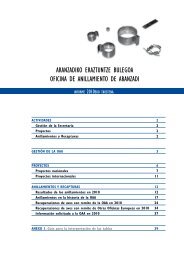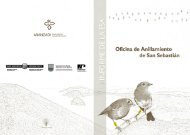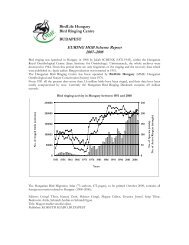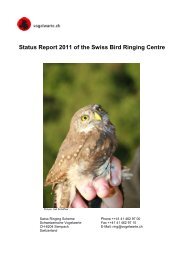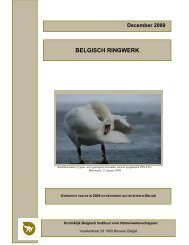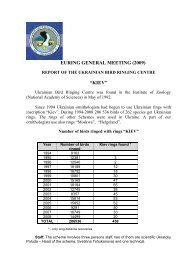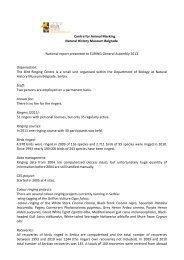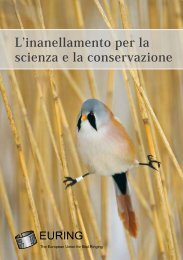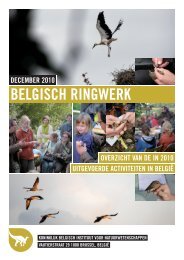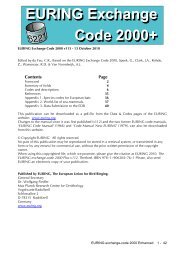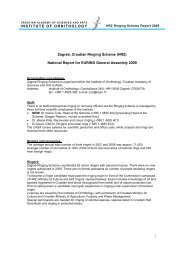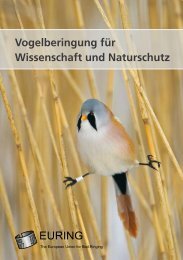here - The European Union for Bird Ringing
here - The European Union for Bird Ringing
here - The European Union for Bird Ringing
Create successful ePaper yourself
Turn your PDF publications into a flip-book with our unique Google optimized e-Paper software.
EURING Code Identifier<br />
integer, one digit<br />
This field shows the history of the record. It is included because some in<strong>for</strong>mation may be lost when<br />
records are translated from one version of the code to a newer one. Analysts will need to be aware,<br />
<strong>for</strong> instance, that records that were originally in 1966 code had co-ordinates given to the nearest<br />
tenth of a degree rather than to the nearest minute.<br />
All data in the EURING Data Bank will be held in EURING2000 code. Any data submitted in earlier<br />
codes will be converted to 2000 code but this field will remain unchanged. Thus, <strong>for</strong> example, a<br />
record originally coded in 1966 code, translated by the scheme to 1979 code and submitted to the<br />
EDB in that <strong>for</strong>m will have code identifier 1. When that record is exported from the EDB it will be in<br />
2000 code but still retain code identifier 1 even though it is now in 2000 code. This code indicates<br />
the history of the record up to the point at which it was submitted to the EDB.<br />
0 EURING Code Manual (1966). Directly coded (no translation).<br />
1 Code Manual New EURING (1979), but<br />
translated from EURING Code Manual (1966).<br />
2 Code Manual New EURING (1979).<br />
Directly coded (no translation of older codes).<br />
3 Translated from earlier code but exact route uncertain<br />
4 EURING exchange-code 2000,<br />
Directly coded (no translation of older codes)<br />
Distance<br />
integer, maximum of five characters<br />
Calculated by computer (Imboden & Imboden 1972) as the distance between the current record and<br />
the first record (=ringing data). <strong>The</strong> distance is given in kilometres (00000 - 99999).<br />
A distance is always calculated, even if the geographical co-ordinates are given as inaccurate.<br />
Analysts should check the field Accuracy of co-ordinates.<br />
<strong>The</strong> distance is not present in the first record (=ringing data), in that case code the code is ----- (five<br />
hyphens).<br />
Note that the distance and direction between two points can be calculated either according to<br />
orthodrome (shortest distance) or loxodrome (constant direction) methods. <strong>The</strong>se two methods can<br />
give rather different results (Imboden & Imboden 1972). <strong>The</strong> method preferred by EURING is<br />
loxodrome. Analysts should check which method is used in the data or else feel free to recalculate<br />
distances be<strong>for</strong>e analysis.<br />
EURING exchange-code 2000 Enhanced 25 - 42



